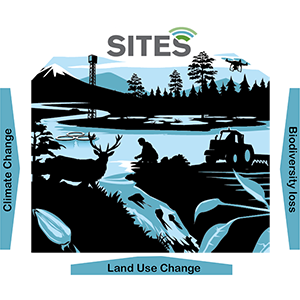Contact
Department of Aquatic Sciences and Assessment, Division of Microbial Ecology

The Swedish Infrastructure for Ecosystem Science (SITES) has been awarded continued funding for 2023–2027 from the Swedish Research Council (VR). SITES is a national infrastructure for ecosystem research that facilitates long-term field-based ecosystem research. Five of the SITES stations are operated by SLU and SLU is also the coordinator of SITES.
SITES has been running since 2013 and offers a unique infrastructure, expertise and open data to the Swedish and international research community. With the continued funding, SITES will continue to promote high-quality research across Sweden linked to the nine participating research stations. Five of these stations, Asa, Grimsö, Lönnstorp, Röbäcksdalen and Svartberget, are connected to SLU, and within SITES they collaborate with stations Abisko, Erken, Skogaryd, and Tarfala, and associated station Bolmen. The secretariat is located at SLU in Uppsala, with operations coordinated by the Director, Stefan Bertilsson, professor of Functional Ecology at the Department of Aquatic Sciences and Assessment.
“The continued funding is a recognition of the high quality and scientific impact of the support provided by our infrastructure”, says Stefan Bertilsson, and adds that the new funding will both secure long-term monitoring programs within the station network and enable the infrastructure to develop in order to meet the future needs of researchers and other stakeholders.
The range in ecosystems and climate zones across SITES facilitates the implementation of standardized and comparable experiments and observations across geographical gradients. In part, this collaboration is organized in three Thematic Programs, SITES Water, SITES Spectral and SITES AquaNet, as well as through competence exchange, data coordination and support and communication efforts.
SITES is an open infrastructure that offers users physical and remote access to the station (i.e. conducting experiments and/or measurements) as well as historical and current data that provides context for research projects and augments new data collected. Station staff provide expert knowledge and background information as well as assist in the implantation of research activities.
SITES collaborates with other relevant research infrastructures and networks across Sweden, e.g. ICOS (Integrated Carbon Observation System) and ACTRIS (The Aerosol, Clouds and Trace Gases Research Infrastructure), and internationally within eLTER , the European Long-Term Ecosystem Research network.
SITES is supported by VR and the partner organizations, i.e. University of Gothenburg, Swedish Polar Research Secretariat, Swedish University of Agricultural Sciences, Stockholm University and Uppsala University. The current funding period started in 2018 and runs until the end of 2022. The funding details for 2023–2027 and the terms of reference will be finalized later this year in dialog with VR.
For more information about the SITES, visit the infrastructure’s website: www.fieldsites.se.